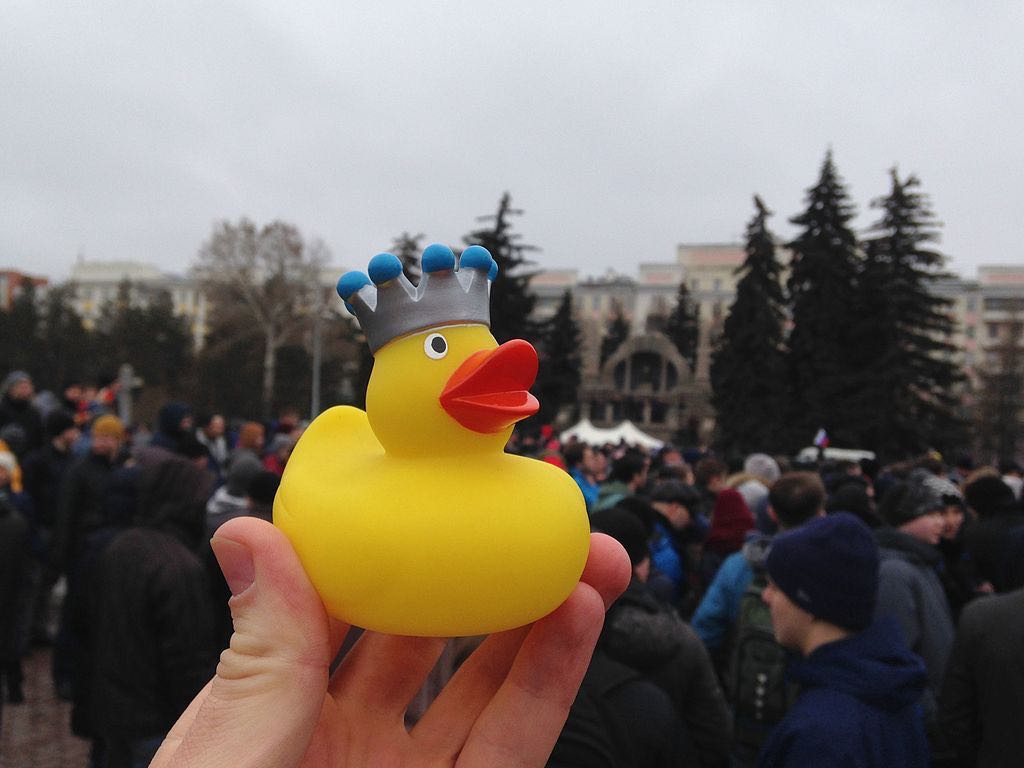With an exposé on Putin's corruption Alexei Navalny targets the Man at the Top directly. Navalny is not in jail and Putin is still in power. Is there no effect at all? There is, says journalist Anna Arutunyan: bit by bit, Navalny's investigations change the perception that corruption is normal in Russia. And people begin to imagine a future without Putin.
Russian opposition leader and presidential hopeful Alexei Navalny latest corruption exposé is targeting Vladimir Putin directly. But what does it change?
Among the first reactions to the video, in which Navalny cites two investigations – one by TV Rain and another by his own Anti-Corruption Foundation – was the anticipation that he’d crossed some kind of benchmark, done the unspeakable by targeting the Man at the Top. But it’s been a week since the video came out, and, although it has over 3 million views and garnered a robust response, not much has changed – Navalny is not in jail, and Putin is still in the Kremlin.
 Navalny targets Putin in his latest video on 'Putin's secret dacha'. Photo from Youtube
Navalny targets Putin in his latest video on 'Putin's secret dacha'. Photo from Youtube
The news Navalny reveals is at once extraordinary and mundane. Extraordinary because it alleges Putin has a lavish dacha on the Finnish border built with the help of a businessman with organized crime links. Mundane because, in the Russian context at least, it isn’t new, and it changes little.
But something is changing, bit by bit, and it has to do less with the news bomb value of Navalny’s latest stunt, but with the fact that he has been doing this for so long. As we get carried away by the sensation of another of Navalny’s exposes and what it will mean for his ambitious, if doomed, presidential campaign against Putin, we lose track of the fact that the real leviathan he is battling against is not so much the man in the Kremlin – although that is a big part of it – but something even larger: corruption and its normalization in Russian society.
A bit of history to put in perspective just the sheer weight of what Navalny is taking on. His Anti-Corruption Foundation, created in 2011, has been releasing exposes against top Russian officials for over half a decade, and, while they might spark a great deal of media attention abroad, their sensationalism at home is limited.
The FBK’s painstaking, detail-obsessed reports, initially published on Navalny’s Livejournal blog until the Navalny.com site was launched in 2015, targeted Russia’s Investigative Committee Chief Alexander Bastrykin in 2012 over his undeclared property in the Czech Republic, State Duma Ethics Commission Chief Vladimir Pekhtin (who resigned in February 2013, shortly after his Florida condominium was exposed), and, in the first of what have since become series of polished, widely-watched YouTube documentaries, a film exposing chief prosecutor Yuri Chaika’s corrupt business empire.
 Russians demanding from president Medvedev response to Navalny's revelations about his luxurious properties.
Russians demanding from president Medvedev response to Navalny's revelations about his luxurious properties.
Navalny’s FBK applied a thorough, legalistic approach to the task – hiring dozens of lawyers and volunteers to scour foreign records and conduct due diligence – but even they were not the first by far to hint at or expose Putin’s illicit wealth.
Recall how in 2007 the Kremlin-connected expert Stanislav Belkovsky estimated that Putin had accumulated a personal fortune of $40 billion. In 2010, a businessman connected to Putin, Sergei Kolesnikov, revealed how Putin allegedly syphoned off funds that went to build a palace on the Black Sea coast. And let’s not forget that among the earliest, and no less audacious corruption allegations, were those made by Marina Salye in the 1990s over Putin’s oil for food scam in the crime-ridden years when he was deputy mayor of St. Petersburg.
All of this has been received with a great deal of outrage in the West, yet none of it – none of it – made any dent in Putin’s popularity back home precisely because it is not news – it’s normal. Following some half-hearted attempts to fight corruption by President Dmitry Medvedev, Putin returned to the presidency in 2012 with a new, imperialistic agenda. Outrage over corruption was certainly voiced in the Bolotnaya protests of 2011 and 2012, but those demonstrations were more about the bigger question of the legitimacy and civil dignity that were undermined when Putin single-handedly decided to return to the presidency. In fact, the allegations may have even gone to play up to the Hollywood villain component of his image: sinister, conniving, and able to get away with anything – which actually plays a positive part in bolstering his power.2
So what?
There was a stark contrast, in my experience, between how these allegations were presented in the media and abroad and how they figured in conversations with fellow Russians. “So what?” was the pervasive sentiment. 'How is this going to change anything?' And, more robustly demonstrating what is really the heart of the problem here, 'there is no corruption in Russia'.
In the West power comes from money, in Russia money comes from power
That last response is actually the opposite of patriotic denial – it concedes that there is no corruption in Russia because corruption is the system: in the absence of rule of law, there is simply nothing to corrupt. And this, really, sums up the leviathan that Navalny is actually tackling.
One popular explanation for this perception of corruption not existing in Russia was offered by commentator Anton Orekh who wrote that, rather than power coming from money as in the West, in Russia money comes from power, and, more importantly, that Putin 'owns the entire country' simply by ruling it. Whether this is a good or a bad thing is beyond the point – more important is the extent to which it is internalized in popular sentiment.
Here, polls show a complex picture of the role corruption plays in people’s lives and what it means for them. Nearly half of the population – 42 percent – has at some point given a bribe to traffic police according to a June 2017 poll by the Levada Center, and the rates for bribes to other institutions are similar. And yet a total of 74 percent believe that corruption can’t be tolerated or is unacceptable. Even a greater share – 89 percent – believe corruption is unacceptable in the government. Clearly there is a substantial overlap – in other words, a good chunk of the population, 32 percent at the very least – finds itself partaking, and in some cases benefiting from, something it finds unacceptable.
Paradoxical attitude
A similar paradox emerges in the figures about Putin and corruption: according to the same poll, 67 percent of respondents believe Putin is either fully or largely responsible for the said corruption, and these figures have remained more or less the same since 2013. And yet, this belief did not seem to affect the surge in Putin’s popularity, with his approval at 81 percent in 2016, according to a Pew poll. The same survey concluded that corruption and economic woes failed to dent Putin’s popularity.
Taken together, this suggests a pervasive cognitive dissonance: people take part in things they find unacceptable and they lavish approval upon a figure they believe is responsible for putting them into unacceptable situations.
The human mind is capable of concocting elaborate mechanisms to cope with just such paradoxes. But sometimes those coping mechanisms – believing that corruption is part of the system and is thus inevitable – themselves become the very block standing in the way of rule of law. Removing those coping mechanisms can be terrifying.
According to sociologist Alexei Levinson, speaking at a conference in Tallinn in May 2017, the Russian is not afraid of the policeman coming for him, he is afraid to be against the system inside himself. To be against it is to create an unbearable psychological collision: either protest on Red Square against Putin or leave.
Allowing oneself to be against the system is difficult, groundbreaking work, but it is gradually happening. The percentage of respondents naming corruption as their top concern went up from 24 percent in 2009 to 39 percent in 2013, according to a 2013 poll. And, in part thanks to the success of the anti-corruption protests launched by Navalny in March following his expose of Dmitry Medvedev, by June the number of respondents who felt positive about the anti-corruption protests reached 58 percent.
Bit by bit, exposé after exposé, Navalny is helping change perceptions. He is doing this by operating from a premise that goes directly against the one normalizing corruption: he insists, believes, and acts as though rule of law exists, and laws can be applied to those who break them.
No, corruption is not normal
He is not doing this in a vacuum – two important contextual circumstances are also pushing the tide against normalizing corruption. The first is the attention Navalny – and particularly his campaign offices – are getting from government authorities. The unprecedented, and on occasion violent, raids of the offices, the harassment of his volunteers, the chemical attack against Navalny himself all help propel him into the media limelight. By trying to scare him and those like him, the Kremlin is, in other words, inadvertently hacking away at, and provoking, the same cognitive dissonance Navalny is. So far, a majority of Russians might not rationalize it, or go up against Putin, but increasingly they are internalizing that there is nothing normal about the way things are.
Recognizing that corruption is not normal can have massively depressive, demoralizing effects. At the latest Navalny protest in June, a 16-year-old described to me his reasons for attending the rally with the following words: 'I will be starting college and I don’t even know what (profession) to choose. There is nothing on the horizon.'
But that is precisely where the second circumstance comes in: Putin’s departure is on the horizon. While there is little question that he will get re-elected in 2018, there is growing certainty that this is going to be his last term. In other words, Putin is becoming a lame duck, and people are beginning to imagine a future without him. All this does not necessarily mean Navalny is going to lead Russians against Putin. It means he is, for now, teaching them how to foster rule of law once Putin is gone.
See also Anna Aruntunyan's Why Navalny should stop his street protests and activist Artemenko's Why street protest is the vital force for democratic changes
